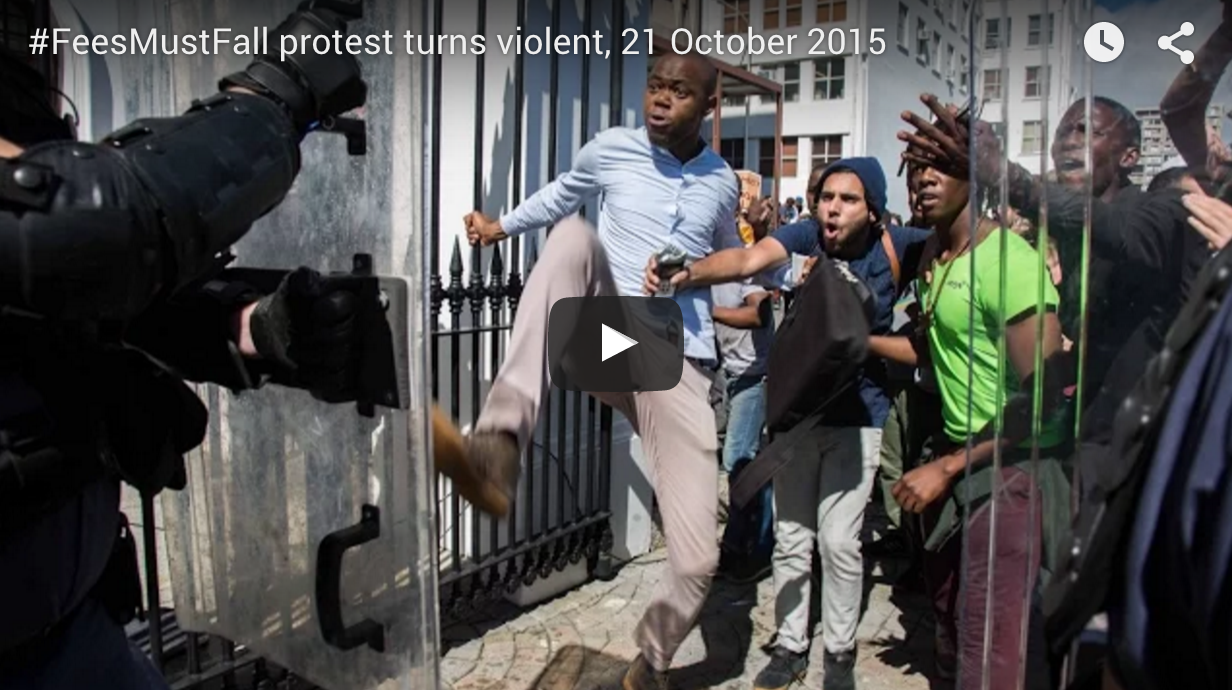Many South African universities remain closed as thousands of students protest proposed fee hikes in what is believed to be some of the largest demonstrations to hit the country since apartheid. So far, 29 South Africans have been charged with violent offences as police continue to use heavy-handed tactics. High treason is among the alleged offences of protesters. And a court is seeking to ban the hashtag #feesmustfall, trending across South Africa.
The demonstrations began last week at the University of the Witwatersrand in Johannesburg and have since spread around the country. South African president Jacob Zuma is meeting with students today to discuss tuition fees. Student negotiations have led to the government offering to cap fees hikes at 6% rather than proposed 10%, but demonstrations continue.
https://twitter.com/_MrBentleySA/status/657102323320229888
A protest outside parliament buildings in Cape Town on Wednesday led to clashes with South African riot police, who fired stun grenades at demonstrators. As the South African minister of higher education, Blade Nzimande, tried to reason with the crowd, he was met with calls for his resignation and placards reading: “Fees must fall, education for all”.
Students pushed past parliament gates and made their way inside the grounds. There, they sat on the ground, blocking entry and exit.
There were similar scenes on Monday night when students occupied the Bremner building at the Univerity of Cape Town. Police showed up in riot gear and arrested many for various offences.
The hashtag #FeesMustFall is being used on social media for people to voice their opinions and follow the protests. Following a request from the management at the University of Cape Town, the South African High Court has reportedly issued an interdiction against the hashtag in an attempt to silence dissent. Jane Duncan, professor of journalism at the University of Johannesburg is quoted in HTXT.Africa, saying that the inclusion of the hashtag demonstrates a clear misunderstanding of how the internet works, and in “its ill-defined breadth” could make criminals of anyone who uses it.
https://twitter.com/lesterkk/status/656909337101774849
How exactly the court intends to enforce a ban on a hashtag remains to be seen, but if true, it would have very serious implications for freedom of expression in South Africa.
A statement of solidarity with students in South Africa has been issued by the alumni of 24 schools, colleges and universities around the world, including King’s College London, as well as the universities of Cambridge, Oxford and Harvard. Signatories are “outraged by the use of violence from police”.
“Each of us stands in solidarity with the students, staff and workers protesting in South Africa, at parliament, universities and institutions of higher education. They are making history on streets and campuses across the country,” the statement reads.
“No unarmed and non-violent group of students should be dispersed with stun grenades, tear gassed, pepper sprayed, or shot at. All should be equal before the law, and we condemn the targeting of black students by the police. We call for the immediate release of students who have been arrested or detained in the context of peaceful protest action.”
Additional research by Anna Gregory, a student at The Crossley Heath School, Halifax, England.





